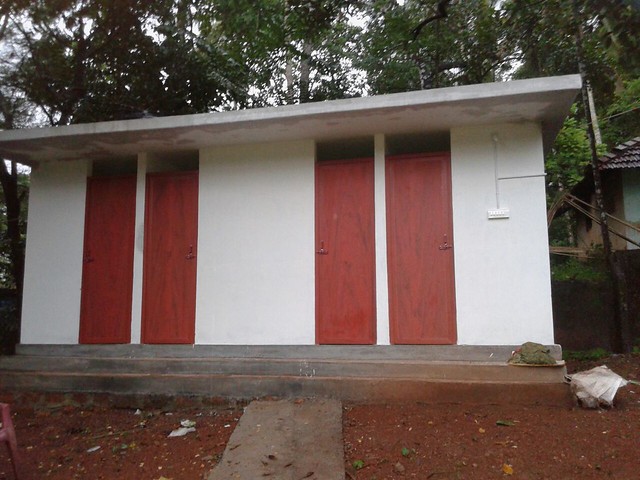Driven by the determination that lakhs of rupees lapse as the Muslim investors are reluctant to receive interests on their bank investments, the MSS puts that interest to use for public welfare activities.
By Shafeeq Hudavi,TwoCircles.net,
Kozhikode: After years of being a barren garden, the garden in front of the Kuthiravattam Government Mental Health Centre is green again and with the cool breeze, extending relief to the health facility’s inmates. Soon after the foundation for the facility was laid in 1997 by the then Chief Minister E K Nayanar, the garden was consigned to oblivion. And to think of it that the garden was proposed to mark the Golden Jubilee of the nation.
 One of the toilets, built by MSS Kozhikode unit at Kozhikode Government Leprosy Hospital using public utility fund.
One of the toilets, built by MSS Kozhikode unit at Kozhikode Government Leprosy Hospital using public utility fund.Now, years later, thanks to the Muslim Service Society’s (MSS) Kozhikode district committee, which ensured the revival of the Centre’s garden, it boasts of an eco-friendly gallery and benches along with a music system. And this is not a singular work take up by the MSS.
When it comes to relief, charity and welfare activities, various Muslim organisations across Kerala are literally in competition with each other. But what makes MSS different is the mechanism that it has developed to take up the welfare measures. Driven by the determination that lakhs of rupees lapse each year as Muslim investors are reluctant to receive interests on their bank investments, the MSS has formed a public utility fund, where the interests of the bank investments are utilised for public welfare activities.
According to P Sikandar, an MSS functionary, Muslims have to rely upon the banks for financial transactions and safe investment. “But, Sharia doesn’t allow them to use the interests for personal purposes at any level. Instead of leaving the interests to banks, we decided to utilise it for the public development, mostly to upgrade the public infrastructure,” he says.
Started in Kozhikode in 1990s, MSS, in various districts, has been implementing the scheme for more than 20 years. By spending Rs 20 lakh every year through public utility fund, the Kozhikode district committee takes a lead in the mission followed by the Malappuram, Kannur and Kasargod districts, which have a sizeable number of Muslims. In Ponnani of Malappuram district, the organisation has been spending Rs two lakh each year for last eight years.
In these four districts, the funds are allocated for construction and maintenance of roads, bus stops, parks, wells, schools and hospital buildings. According to Ponnani unit secretary, Abu Swalih, the unit is also taking part in various schemes, mooted by the state government and the Centre by contributing their bit. “The Centre has proposed a comprehensive drinking water project to address the acute shortage of water in the Ponnani municipality limits. We have so far allocated Rs one lakh for the project and will revise the amount if needed,” says Abu Swalih.
Sikandar says that they have so far built several bus stops and roads. Besides, a ward of the Kozhikode Government Medical College was recently renovated by the fund in addition to the sanitation works, taken up in the Kozhikode Government Leprosy Hospital. The scenario is almost same in Malappuram, Kannur and Kasargod districts, where the funds are used for drinking water distribution in the hill hamlets and improving the basic facilities of the government schools.
“The public works are impeded with inordinate delay if we wait for the government fund to be disbursed. These gaps can be easily filled through such fund allocation. The society is in dire need for such activities,” says MSS Kannur district president Dr Aboobaker.
MSS Kasargod district president Abdul Naser says that they receive warm response from the people, who are approached for money through the scheme. Taking a cue from the good response it is receiving from four districts, the MSS has decided to spread the scheme across the state by spreading awareness.

